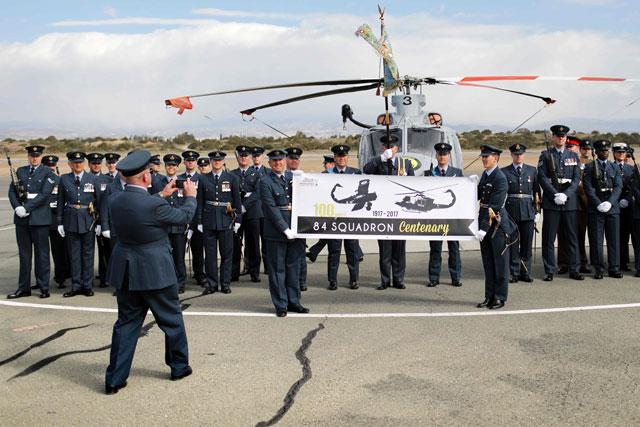You are here
Cyprus talks break up over decades-old vote
By AFP - Feb 16,2017 - Last updated at Feb 16,2017

Members of the RAF Akrotiri multirole 84 Squadron pose for a photo in front of a Griffin HAR2 helicopter, during a parade marking the centenary of the 84 Squadron at the Sovereign Base Area of Akrotiri, a British overseas territory located 10km west of the Cypriot port city of Limassol, on Thursday (AFP photo)
NICOSIA — A round of UN-brokered peace talks between rival leaders of divided Cyprus broke up in acrimony on Thursday over moves for schools to honour a decades-old referendum on union with Greece.
Tensions have soared over the approval by the Greek Cypriot parliament for schools in the south of the island to mark the 1950 referendum on “Enosis”, or union with Greece.
Turkish Cypriot leader Mustafa Akinci said that when the issue came up of scrapping the decision to mark the referendum, his Greek Cypriot counterpart Nicos Anastasiades said there “was nothing else to say, slammed the door and left”.
“At that point there was nothing more to do as this meeting needs to be conducted in an atmosphere of respect so we also left the meeting,” he told reporters.
But Anastasiades said the Turkish Cypriot side left the talks first.
Akinci’s walkout was “unwarranted and without cause or reason”, he said on television, adding that UN envoy Espen Barth Eide, chairing the meeting, was also “unaware of what happened”.
Eide, who is due to make a statement later in the day, already acknowledged that “this is not the best climate” as he held separate talks with the two leaders on Wednesday to try to head off a crisis.
Anastasiades said that despite the envoy’s efforts to persuade Akinci to return, the Turkish Cypriot leader was “adamant” and left the area.
But Turkey, like Akinci, also said it was the Greek Cypriots who left the negotiations.
“If they want to have talks, they will have to come back to this table, [but] if they don’t want to, then there will be no more talks,” Foreign Minister Mevlut Cavusoglu told journalists in Bonn.
The 1950 referendum — before Cyprus won independence from colonial ruler Britain — overwhelmingly approved Enosis but had no legal value.
‘Great damage’
Almost 96 per cent of the island’s majority Greek Cypriots signed up in favour of union between Cyprus and the “motherland” Greece in the unofficial referendum held in churches and coffee shops across the island, according to its organisers, the Cyprus Greek Orthodox church.
The new schools legislation, sponsored by the far-right ELAM Party, essentially calls for secondary students to mark the referendum anniversary by learning about the event and reading leaflets dedicated to understanding the Enosis cause.
In a letter to UN Secretary General Antonio Guterres on Wednesday, Akinci warned the move would cause “great damage” to the peace process.
Turkey, for its part, has criticised Anastasiades for trying to make light of the referendum and demanded the Greek Cypriots change their “mentality” when it comes to accepting Turkish Cypriots as “co-owners of the island”.
The two sides have been engaged in fragile peace talks since May 2015 that observers have seen as the best chance in years to reunify the island.
In January, the UN hosted talks in Geneva bringing both sides together for the first time with the three “guarantor powers” of Britain, Greece and Turkey.
Much of the progress until now has been based on the strong personal rapport between Anastasiades and Akinci, leader of the breakaway Turkish Republic of Northern Cyprus, who was born in Limassol which is now in the south.
“The Greek [Cypriot] leader has acted from time to time hot-headedly,” said Akinci.
“In the past we tolerated it until the last drop. It was not possible to tolerate this now,” he added.
The eastern Mediterranean island has been divided since 1974, when Turkish troops invaded the northern third in response to an Athens-inspired coup seeking Enosis.
Related Articles
DAVOS, Switzerland — The leaders of the divided island of Cyprus will make an unprecedented joint appeal to the world's political and busine
NICOSIA — Turkish Cypriot leader Mustafa Akinci on Saturday proposed creating a joint committee across the divided Mediterranean island, to
NICOSIA — Right-wing nationalist Ersin Tatar, backed by Ankara, beat Turkish Cypriot leader Mustafa Akinci at the polls on Sunday after advo

















